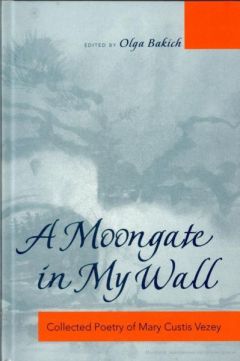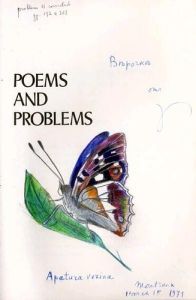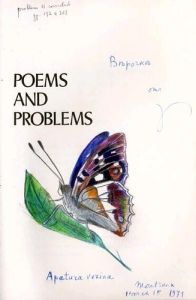Мария Визи - A moon gate in my wall: собрание стихотворений
Shanghai, [Sept. 1934]
514. «If I had but a little common sense…»
If I had but a little common sense,
I would forsake you, 1 would travel hence
and maybe see, in lovely places, far,
that you were not the sky's most brilliant star.
Perhaps on lofty mountains I would seek
the flaming flower of the snow-clad peak,
or on some island in the sunny sea
forget the words that you have said to me.
There are so many wonders I could find,
that life would yet be bountiful and kind,
and going so I should not drop a tear,
— if I had sense…
But I have none, my dear.
Shanghai, 23 Oct. 1934
515. «It's not because you leave me that I weep…»
It's not because you leave me that I weep,
nor am I broken just because we part, —
but that the coin of friendship proved so cheap,
and that your word meant nothing in your heart.
Leave me now, go; I will not need you more.
Travel your way, while I shall walk my own;
Let not your conscience worry on my score:
I may be even stronger so, alone.
But should I ever meet you later on —
tired and sick and begging me for bread
with all your luck and earthly glories gone —
better for you if one of us were dead,
for I may turn and give a stone instead.
Shanghai, [1934]
516. To a Man Named Smith
Once in this world of mountain, wood and plain
my road crossed yours. We will not meet again.
But as a dawn breaks open sunlit skies —
so once we looked into each other's eyes.
In that brief hour the words we spoke were few,
and when you went, and I lost sight of you
still all the birds were trilling, and the day
shone just as golden as I walked my way.
Poor foolish heart — why should it cry and cry
because you crossed the verv hour as I?
Shanghai, [1934]
517. «Quiet the waters were, — do you recall?..»
Quiet the waters were, — do you recall? —
quietly did the waters rise and roll
in low and gentle swells, when one fine day
you dropped your anchor in my slumbering bay.
Softly the breezes from the western sky
swept over silent sands where you and I
gazed at the sea — and not a shadow fell,
nor came a cloud to break the golden spell.
How can I wonder now, with you no more,
that black the waters rise, and roar, and roar?
23 Feb. 1936
518. «High in the mountains, where the grass is cool…»
High in the mountains, where the grass is cool,
we tied our horses by an emerald pool,
and as they drank, as they neighed in glee,
we two sat motionless, and speechless, — we.
Upon the shining flanks of your black steed
you watched the water flicker, bead by bead;
you never raised your eyes, yet well you knew —
that all the while 1 only thought of you.
Dear dream forgotten, dream that was so frail!
The evening sky was cloudless, calm and pale —
could I have guessed, as we resumed that trail,
that every star would wane, and every stream
run dry and silent, as in a by-gone dream?
23 Feb. 1936
519. Falling Star
Star as you fell through the blue evening air
when I stood watching you, silent and thrilled,
I was supposed to have breathed a word of prayer
that some deep wish I had might be fulfilled.
But, star, oh, — white, round star, — I saw you fall,
breathlessly saw the light behind you trailed,
and I forgot the earth I trod, and all
earthly desires and wishes, — and I failed…
Bitter my sorrow now, and sore regret
not to have grasped the chance the day it came!
But such was your swift sudden spell, that yet
if others fell — I still would do the same!
Shanghai, [1936]
520. «I'm often dreaming…»
I'm often dreaming
that I unfurl
my tall wings, gleaming
like mother-of-pearl,
and cut my tether,
and take to flight,
with each small feather
glistening white;
but, oh, I waken,
and, to atone,
breathless and shaken
fall, like a stone,
and see — a token
of earthly things —
they're broken —
my shining wings!
[1936]
521. «I am a stranger here. Leave me alone…»[233]
I am a stranger here. Leave me alone.
My eyes are tired of your streets of stone,
your tower houses; I am used to wood
and hill and meadows and to solitude.
All now is ended — all the wild birds flown,
and stars burnt out which had so brightly shone —
all the tall stately firs stand bare and dead
and silent lies each empty riverbed.
Only the still brown rocks, moss-covered, keep
their watch where silver wavelets curl and creep,
and that same sky, sunless and cold and grey,
hangs, — as the morning when I sailed away.
Shanghai, 1936–1937
522. «I hope from where you sit or lie…»[234]
Norma Jean
I hope from where you sit or lie
that you can see a patch of sky
at night, with angels flitting by,
each lighter than a sigh.
I hope that thru your window pane
you see trees, dripping in the rain,
or stooping low as under strain
where heavy snow has lain.
That you can watch a billowy cloud
sailing, like some white galleon proud,
and birds around it, crying loud,
ever a joyous crowd;
I hope that you may never tire
of watching sunlit skies on fire.
27 Nov. 1951
523 Nocturne(«White clouds…»)[235]
White clouds
Remote
Like little explosions
Climb the sky and float
Above the black erosions
Of the castle moat.
Behind the grey parallelogram
Of his castle wall
The aged knight
Snores, for he doesn't really give a damn
At all
For the beauty of the night.
But in her tower
The knight's young daughter
Forgetful of the hour,
Silently watches
The silver splotches
Upon the water.
29 Mar. 1955
524. Impressions at the Opera (a true story)
Three dowagers with silver tresses
and silver foxes over pale-blue dresses
floated into their box,
fox after fox,
and settled down,
like pillows stuffed with eiderdown.
And Salvatore Baccaloni,
as Bartolo up on the stage,
though usually quite the rage,
seemed not as fat,
nor half as funny.
21 Feb. 1956
525. «It is usually very still on that day…»
It is usually very still on that day,
which comes at different times in different places;
came in the end of October in the place where I lived.
Very still and cold, and then, toward evening,
the air is suddenly warmer.
Nature stands still, you can hear the earth breathe,
the trees reach out and wait.
Stars that had been very brilliant
all at once turn opaque.
It is then that the first snowflake of the winter, always
large and slow, is wafted, like a small parachute, down
upon the expectant earth,
in hushed silence.
27 Feb. 1956
526. «With folded wings he sat and took a rest…»
With folded wings he sat and took a rest
upon a branch not far from where his nest
was hidden in the thicket from sharp eyes
and sharper claw and long,
deep in a wood of aspen and of beech
where sunrays rarely reach,
where stillness lies
and shadows hang.
Quietly he sat, small, gray and soft,
colorless lump of life, alone, aloft,
seen and admired by no one.
Then he spread
his wings,
most powerful among such minute things,
and, gray no more
but golden in the sun, he rose to soar,
and then he sang…
February 1956
527. «Nothing is left to write of any more…»[236]
Nothing is left to write of any more,
all that there is to say was said before:
all is recorded — every human breath.
The poets have discussed God, love and death,
the seasons and the land and water here,
cities around us, and the atmosphere,
creatures from the amoeba to the auk,
including beings that can sing and talk.
All you need do is listen, gratefully,
to Swinburne, or Verlaine, or Po Chu-i.
7 Mar. 1956
528. Nocturne («Late twilight in October…»)
Late twilight in October.
Stillness hangs
above primeval marshes like spun glass.
Escaping lightly from the reaching arms
of scrawny birch, the moon,
opaque and naked,
drops her seventh mist.
No rustle stirs
the elderberries. Sorrowful, a loon
raises his pointed head among the blades
of marsh grass; even he does not invade
the silence with habitual complaint.
This is when
suddenly, passing high above, departing cranes
cry out between the earth and moon
urgently, clearly, for a rapid moment;
the marshes bear their soft
provocative and wistful voices,
high in the air, yet ultimately close;
then they are gone.
And in their wake
the first large timid snowflakes
dim the moon.
15 Feb. 1957
529. «There is something you want to say…»[237]
There is something you want to say —
thoughts gurgling in your brain,
words choking your throat.
Say them, say them before you stop breathing,
see the darkness converging upon you
from the sky — from the shore — from the water —
The circles upon the water grow large and flat
and disappear altogether,
and the surface is silent.
Speak out — call loudly
and say all those turbulent words,
cry lustily
so that the shores will echo,
then whisper softly
those last compassionate words,
and all will be dark, dark.
1 Mar. 1957
530. «There was hoarfrost on the lawn this morning…»




